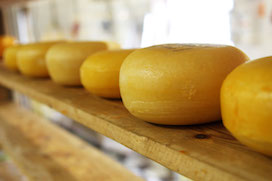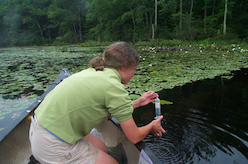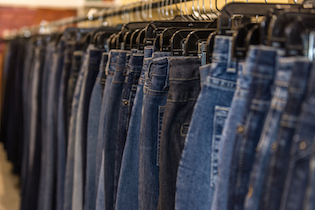So Much to Say, So Little Time
Eight students get five minutes each to talk up UMaine sustainability projects…
The topics run the gamut from cheesemaking startup businesses and the reuse of material goods to building energy-saving window inserts, weed management on organic farms, and engaging citizen scientists to investigate lake water quality. The tie that binds all the topics is sustainability and the State of Maine.
Eight UMaine students from a variety of disciplines will give details of these projects in their “Sustainability Lightning Talks” at the Mitchell Center Seminar on November 21st from 3 to 4 p.m. All of the students’ specific research is connected with a larger group project. Say Cheese
Say Cheese
Honors College and business management student Brady Davis will lead things off with his talk “Cheesemaking in Maine: Investigating Network Connections and Sustainability.” Maine’s food system is currently seeing a rise in the number of new farmers and food producers establishing businesses and entering markets, with small-scale, artisanal cheesemaking one specific area of growth. Davis’s project analyzes the business and waste-management networks of cheesemakers to see how connections can be leveraged, fostered, and strengthened to support the overall sustainability of this emerging sector.
Fish Fry?
The Gulf of Maine’s waters are warming faster than 99 percent of the world’s oceans. What implications does this have for Maine fishermen who are dependent upon fishing and constrained by limited entry fishery licensing? Anthropology Ph.D. student Sarah Ebel’s interdisciplinary team will discuss their approach to researching these issues in their talk, “Interdisciplinary Research to Address Socio-Ecological Uncertainty and Abrupt Ecological Change in Downeast Maine.” Their research aims to contribute further understandings of socio-ecological linkages and adaptation to climate change in Downeast Maine.
A Window on Energy Savings
Master’s student Daniel Mistro is part of an ongoing effort to build simple, inexpensive energy-saving window inserts through community-based volunteer efforts. Led by Sharon Klein of the School of Economics, and now in its second year, the 2015 build resulted in 315 completed inserts by 40 volunteers, 30 customers and 10 students working on the service learning project. In addition, a series of surveys analyzing the outcomes with respect to energy savings was done and Mistro is developing a simple model to project potential energy savings for customers who install the inserts. According to Mistro, the inserts can be shown to save fuel and money, and have an observable positive impact on the communities adopting them.
Vulnerable Lakes, Engaged Citizens
Master’s student Kaci Fitzgibbon’s talk “Engaging citizen scientists to evaluate potential for water quality decline in Maine lakes” details her work as part of a larger effort to understand lake vulnerability with respect to excess nutrients and loss of water quality. The project aims to identify and measure the physical and chemical characteristics that make lakes vulnerable to external stresses including regional warming and land use changes. In 2015 and 2016, the project studied 42 lakes with assistance from volunteers in Maine’s Volunteer Lake Monitoring Program. Collaboration with volunteers allows researchers to identify the underlying factors that encourage successful collaborations among citizen scientists.
Risky Business
Nature-based tourism is one of Maine’s most economically important industries and projected climate change is likely to impact this sector—especially vulnerable areas that rely on winter nature-based tourism. Master’s student Lydia Horne of the School of Forest Resources will talk about how perceptions of risk can influence and determine behavior, such as a person’s travel plans and management decisions. Western Maine was selected as a study site because of its high dependence on winter outdoor recreation and the importance tourism has in supporting community resilience.
Deep in the Weeds
Agricultural weeds are a major production challenge on Maine vegetable farms—organic farms in particular. Labor costs required to effectively control weeds are a substantial burden to farmers, and improved weed management can lead to increased yields and decreased costs, contributing to economic sustainability. Ph.D. student Sonja Birthisel’s talk will highlight efforts to build a computer-based decision support tool that will allow growers to virtually “experiment” with combinations of weed management tactics, and see the simulated impacts on their weed pressure within a growing season, and in subsequent years. The lightning talk will highlight progress on the model to date, and a conceptual design for the decision support tool.
Science with Attitude
Maine and New Hampshire rely on clean coastal waters for their tourism industry and commercial marine fisheries. Coastal residents live, work, play, and harvest seafood from coastal waters, making potential impairments to those waters both a public health and environmental concern. Ph.D. student Emma Fox’s research, part of the New England Sustainability Consortium (NEST) Safe Beaches and Shellfish Project, explores the connection between citizens’ latent attitudes and their support of coastal water quality programs as a means of better understanding the underlying drivers of citizen attitudes about water quality: what impacts it, who is responsible for protecting it, and how it might be important to coastal residents.
Shop ‘n’ Swap
Consumption of material goods is strongly linked to global climate change, particularly in affluent countries like the US. According to Ph.D. student Brieanne Berry’s talk “Reuse and Social Capital,” it has been suggested by scientific bodies that there is a need to find “happiness with lower levels of material consumption.” Reuse is one way to approach this challenge. Sharing, swapping, lending, and selling used goods allows people to use fewer resources to maintain a comfortable standard of living. Reuse is an important part of Maine’s solid waste management hierarchy, prioritized above recycling, composting, incineration, and landfilling. Understanding how reuse can strengthen communities and build trust is another way to make the argument for robust support for reuse.
The Sustainability Lightning Talks will be held in 107 Norman Smith Hall. A question and answer period will follow.
By David Sims, Mitchell Center for Sustainability Solutions
